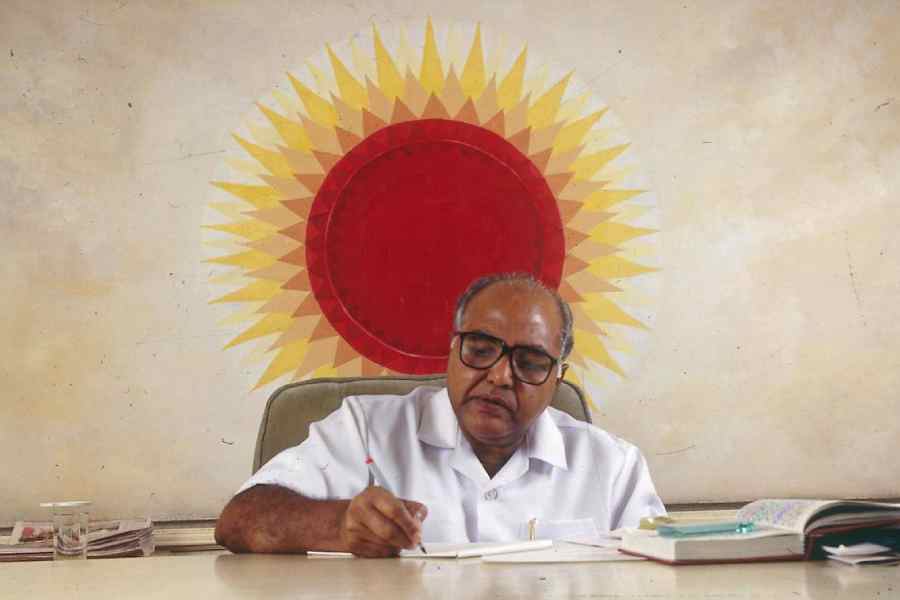There is a difference between journalism that is captured by politics, as the Narendra Modi era has been demonstrating, and journalism that shapes politics as Ramoji Rao set out to do with his newspaper, Eenadu, in the 1980s. Rao, who died on June 8 at the age of 87, was a politically active newspaper publisher and media proprietor who helped chief ministers come to power in undivided Andhra Pradesh — first, the actor-politician, N.T. Rama Rao, in the early 1980s, and, later, NTR’s son-in-law, N. Chandrababu Naidu, when he staged a coup against his father-in-law. In ironic timing, the Telugu Desam Party, which NTR founded and Rao promoted, regained power in the bifurcated state of Andhra Pradesh even as Ramoji Rao passed on and was sworn in a few days later.
Naidu announced a two-day state mourning and the president and prime minister heaped praises on Rao. All this served to underline that there has been no media owner with Rao’s record in recent decades, especially after he launched a bouquet of multi-lingual TV channels spanning news and entertainment, the ETV Network. The only comparable media figure would be the doughty stalwart, Ramnath Goenka, the founder of The Indian Express group, who impacted national politics till the 1980s when Rao was just coming into his own.
Rao came from a farming family and developed business interests that went beyond the media. A successful chit fund, run through his finance company, Margadarsi, helped finance enterprises that included the enduring brand of Priya pickles, a sprawling film city spread over 1,600 acres (said to be the world’s largest), film production, hotels, ship-building, and a public school in his wife’s name. His wealth has been variously estimated between Rs 35,000 crore and Rs 50,000 crore, which would have made him one of India’s wealthiest men. Rao’s total assets do not figure in such standard compilations as the Hurun Global Rich List, although his Ushodaya Enterprises features with Rs 2,500 crore.
Typical of his imaginative range was Ramoji Film City, located at a few hours outside Hyderabad. The project transformed a rocky wilderness and offered film-makers the full range of facilities needed to make a film, including a hotel to house actors and crew. The variety of sets for shooting ranges from street scenes to a landscaped Japanese garden for song sequences. Rao also had a film production company, which produced several films, some of which won prominent awards. If film production was synonymous with Tamil Nadu, he sought to change that.
But it was Eenadu that made Rao a media icon. Launched in 1974, it set a template for a stringer-based expansion of district journalism two decades before Dainik Jagran and Dainik Bhaskar got there. Writing for The News Minute, the Hyderabad-based journalism professor, Padmaja Shaw, describes the rigour Rao invested in new ventures. After starting Eenadu he founded the Eenadu Journalism School to strengthen the language skills of journalists coming to work for the paper. They were taught to use a spoken language version of Telugu to communicate better with rural audiences. New recruits, she says, had to read classics every week, review them and do translation exercises to learn precision in expression. A Research and Reference Wing was also set up for students to use.
Shaw also sums up the localisation he did to bring newspapers to rural readers in the morning, to give them news from their backyard, and to provide an advertising platform for local businesses. In the 1970s, papers would arrive late in the evening or the next day in many remote areas of then Andhra Pradesh. That changed when Eenadu devised aggressive strategies for distribution, introducing district editions and tabloid supplements, and an army of stringers to collect local information. The Hindi newspaper revolution which unfolded in India’s Hindi heartland in the 1990s employed the same strategy.
Ramoji Rao did not envision a journalistic practice free of caste and politics. Both he and NTR were Kammas, a dominant, non-Brahmin caste group pitched against a Reddy-dominated Congress, and he revelled in using his media to fight political battles, notably against the Congress. This had consequences and Rao met his match in Y.S. Rajasekhara Reddy, the 14th chief minister of Andhra Pradesh. YSR looked for Rao’s jugular and found it in the chit fund, Margadarsi. In 2006, he complained to the Reserve Bank of India and the Central government that Margadarsi was collecting deposits from small investors in violation of RBI norms. When the RBI prevented Margadarsi Financiers from accepting any more deposits and directed it to repay depositors as and when their deposits matured over the next three years, the financial squeeze forced Ramoji Rao to sell part of his ETV network to the investment firm, Blackstone. But YSR lobbied with New Delhi to block the deal that would rescue Rao from his financial troubles. Eventually, a Reliance Industries Limited subsidiary stepped in as the buyer in a deal fronted initially by the financier, Nimesh Kampani. The channels that changed hands are part of Reliance’s Network 18, while the Ramoji Group continues to own and operate its Telugu-language channels.
The trouble with using your media to fight political battles is that it gives your opponent ideas. The fierce political rivalry between the TDP and the Congress became a media rivalry after Rao’s use of Eenadu gave YSR Reddy and his son, Jagan Mohan Reddy, the idea of launching a rival multi-edition newspaper called Sakshi as well as Sakshi TV. But political fortunes turn. After Jagan Reddy’s comprehensive electoral defeat in Andhra Pradesh this month, Eenadu and the TDP are back in business with Ramoji Rao smiling down at them from wherever he is.
Sevanti Ninan is a media commentator and was the founder-editor of TheHoot.org











